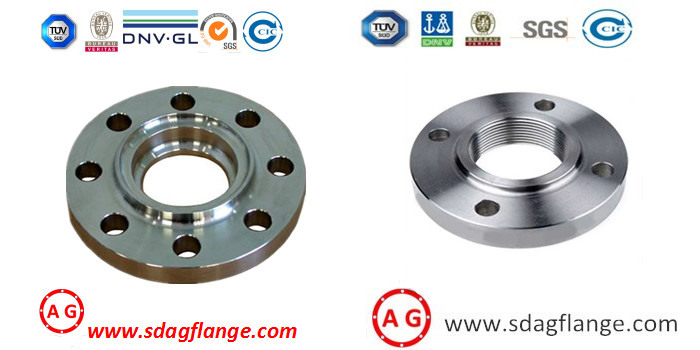

Strict screening of raw materials
The first step in the production of threaded flanges is the screening of raw materials. Common materials include carbon steel, stainless steel, and alloy steel. Taking alloy steel as an example, in some scenarios that require extremely high strength and corrosion resistance, such as offshore oil platforms, steel containing alloy elements such as chromium and molybdenum can maintain stable performance in high salt and high pressure environments. When purchasing, the manufacturer will strictly review the quality certification documents of the materials and conduct chemical composition analysis and mechanical property testing. Only materials that meet the standards can enter the production process.
Precision forging processing
Forging is an important process in the production of threaded flanges, which can significantly improve the density and strength of the flange. During the forging process, the billet is heated to the appropriate temperature and subjected to plastic deformation using hydraulic presses or air hammers to obtain the desired shape. For large threaded flanges, free forging technology is often used, and the size and shape of the forging are precisely controlled through the operation of skilled craftsmen. Small flanges are commonly forged using the die forging process, which forms them in one go under the constraint of the mold to ensure product consistency.
The key steps of thread machining
Thread processing directly affects the connection performance of threaded flanges. According to the production scale and precision requirements, cutting or rolling processing can be selected. Cutting processing utilizes equipment such as lathes and milling machines to cut materials with cutting tools to form threads. This method is highly flexible and suitable for small batch production and special thread processing. Rolling processing is the process of using a rolling wheel to cause plastic deformation on the surface of the billet, thereby forming threads. Compared to cutting processing, rolling processing has higher production efficiency and can improve the strength and surface quality of threads, making it widely used in mass production.
Surface treatment and quality inspection
Surface treatment is essential to enhance the corrosion resistance and wear resistance of threaded flanges. Common processing methods include galvanizing, nickel plating, and spraying anti rust paint. Galvanizing can form a dense zinc protective film on the surface of the flange, effectively preventing oxidation and corrosion. After surface treatment, a comprehensive quality inspection of the threaded flange is required, including size measurement, appearance inspection, thread accuracy testing, and pressure sealing testing. Only products that pass all inspections can enter the market.
The diverse application areas of threaded flanges
Petrochemical industry: ensuring the safety and stability of production
In the petrochemical industry, pipeline systems need to transport various flammable, explosive, and corrosive media, requiring extremely high safety and sealing requirements for connectors. Threaded flanges play an important role in situations where welding is not possible, such as gas stations and flammable liquid storage areas, due to their convenient installation and maintenance. For example, in the pipeline system of a refinery, alloy steel threaded flanges ensure the safe transportation of media such as crude oil and finished oil due to their high strength and corrosion resistance.
Construction Industry: Building Reliable Water Supply and Drainage Systems
In the field of architecture, threaded flanges are commonly used for pipeline connections in water supply and drainage systems. In residential and commercial buildings, pipeline systems need to withstand a certain amount of water pressure, and the good sealing performance of threaded flanges can prevent water leakage. Meanwhile, its simple installation can shorten the construction period and reduce labor intensity. In the water supply and drainage system of high-rise office buildings, carbon steel threaded flanges can meet the connection requirements and have a high cost-effectiveness.
Mechanical manufacturing industry: assisting in the stable operation of equipment
In the mechanical manufacturing industry, the pipeline connections of hydraulic and pneumatic systems have strict requirements for sealing and reliability. Threaded flanges are widely used in these systems due to their excellent sealing performance and convenient installation characteristics. In the hydraulic system of industrial robots, stainless steel threaded flanges ensure stable transmission of hydraulic oil and guarantee precise robot movements.
With the continuous advancement of industrial technology, the production process of threaded flanges will continue to be optimized, and the application fields will also continue to expand. Production enterprises need to keep up with market demand, increase investment in technological innovation, improve product quality and performance, and provide better connectivity solutions for the development of various industries.
